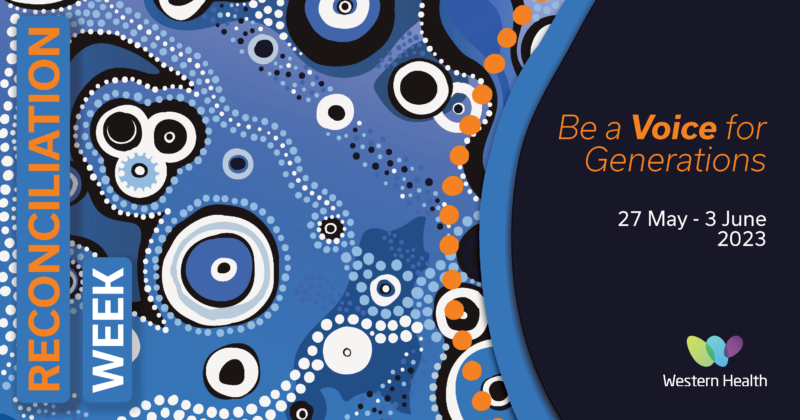Published on 29 May 2023
Western Health acknowledges the Traditional Custodians of the land on which our sites stand, the Wurundjeri Woi-Wurrung, Boon Wurrung and Bunurong peoples of the greater Kulin Nation. We pay respects to Elders past, present and emerging.
We are committed to the healing of country, working towards equity in health outcomes, and the ongoing journey of reconciliation.
Western Health is committed to respectfully listening and learning from Aboriginal and Torres Strait Islander people and wholeheartedly supports their journey to self-determination.
This week we recognise National Reconciliation Week (May 27 – June 3).
It’s a time for us to acknowledge our shared histories, cultures and achievements, and understand how we can create a reconciled Australia.
Here are five things that you can do to help build a better understanding and appreciation of the past and the present and help us on our journey towards a just and equitable future for all Australians.
UNDERSTAND RECONCILIATION
To achieve reconciliation, it’s important that we learn about and celebrate the rich diversity of Aboriginal and Torres Strait Islander cultures and histories, and develop strong relationships built on acknowledgment and respect.
Read about how reconciliation will strengthen the relationship with First Nations people and non-Indigenous Australians.
ACKNOWLEDGE COUNTRY
Did you know that an Acknowledgement of Country should be included in all meeting agenda templates and at the start of all education sessions held at Western Health?
An Acknowledgement of Country is an opportunity to show respect for Traditional Owners and the continuing connection of Aboriginal and Torres Strait Islander peoples to Country. It can be offered by both Indigenous and non-Indigenous peoples before a meeting, speech or event. You can also include it in your signature block.
Western Health has a new Acknowledgement of Country that builds on this by also confirming our shared commitment to listening and learning from First Nations people, achieving equity in health outcomes, and the ongoing journey of reconciliation.
A Welcome to Country
A Welcome to Country differs from an Acknowledgement as it is delivered by Traditional Owners, or First Nations people who have been given permission from Traditional Owners to welcome visitors to their Country.
KNOW THE LANDS ON WHICH YOU STAND
Country is the term often used by First Nations people to describe the lands, waterways and seas to which they are connected.
You might like to discover more about the lands you travel to, or where you live and work. The AIATSIS map of Indigenous Australia is a great guide for discovering the traditional owners of the land across Australia.
THE VOICE TO PARLIAMENT
Later this year, Australians will be asked to vote in a referendum on whether to change the Constitution to recognise the First Peoples of Australia by establishing an Aboriginal and Torres Strait Islander Voice.
Now is a great time to improve our understanding of the proposed Voice to Parliament.
You can also read the statement in support of self-determination by Western Health’s Board of Directors.
CULTURAL SAFETY IS EVERYONE’S JOB
Aboriginal and Torres Strait Islander cultural safety means that we are creating an environment where there is no challenge or denial of our First Nations patients, staff and volunteers identity or experience.
You can improve your cultural awareness by completing Aboriginal Cultural Awareness training on WeLearn, and I encourage you to undertake this package throughout this week. You can also read the Western Health Aboriginal Health Cultural Safety Plan 2022-2025 to learn about what we are doing as a health service to improve the cultural safety and health outcomes of our First Nations consumers, staff and volunteers.
Thank you for your commitment to furthering our understanding of reconciliation as we continue the important journey towards equitable health outcomes for Aboriginal and Torres Strait Islander people.



